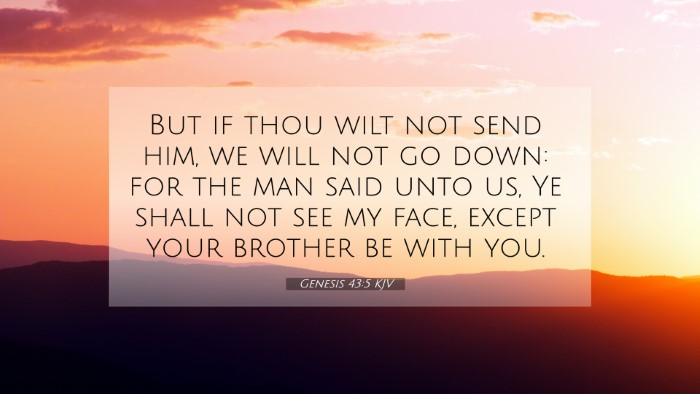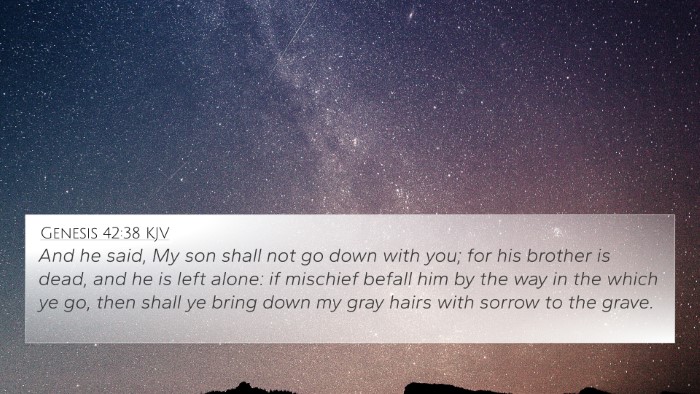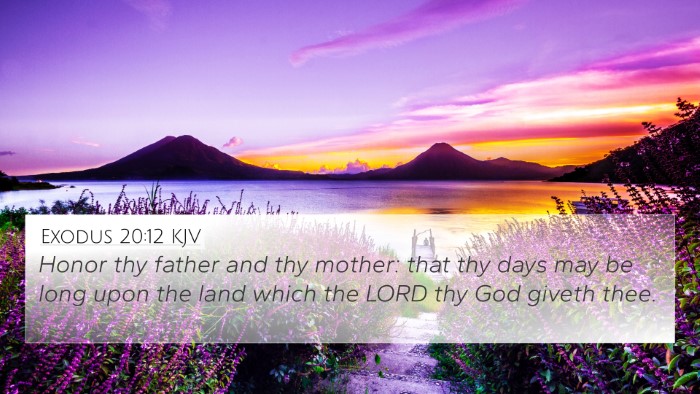Understanding Genesis 43:5
Verse Translation: Genesis 43:5 states: "But if you will not send him, we will not go down: for the man said unto us, Ye shall not see my face, except your brother be with you." This verse captures a critical moment in the narrative of Joseph and his brothers, highlighting themes of family, trust, and the consequences of past actions.
Verse Context
This verse appears during a tense period in the story of Joseph, after he has revealed his identity to his brothers but has required them to bring their youngest sibling, Benjamin, with them in order to see him again. This moment serves as both a test and a means of reconciliation.
Commentary Insights
- Matthew Henry: Henry emphasizes the importance of their unwillingness to go back to Egypt without Benjamin. This reflects their past guilt regarding Joseph and serves as a lesson about the need for honesty and integrity within family relationships. He also highlights the implications of prophecy and the unfolding plan of God through these familial struggles.
- Albert Barnes: Barnes points out the critical nature of this demand by Joseph as a means to ensure the safety of Benjamin and the integrity of his brothers. Barnes suggests that Joseph uses this challenge to test their character and to gauge their willingness to change from their past actions.
- Adam Clarke: Clarke provides a deeper theological reflection on the implications of the brothers' fear and reluctance. He ties their hesitance to a larger narrative of God's providence and the unfolding of His plan through each family member's actions, emphasizing the faithfulness of God even in family trials and tribulations.
Bible Verse Cross-References
- Genesis 37:31-33: This passage discusses the brothers deceiving Jacob about Joseph's fate, establishing themes of betrayal and family strife that resonate throughout their interactions.
- Genesis 42:36: Jacob expresses his grief over the loss of both Joseph and now the potential loss of Benjamin, highlighting the theme of familial loyalty and the burdens of guilt.
- Genesis 45:4-8: Joseph's revelation of his identity and the reconciliation that follows serves as a contrast to the hostility seen earlier with the brothers, showcasing God's redemptive purpose.
- Exodus 3:6: In this verse, God speaks of being the God of Abraham, Isaac, and Jacob, showing the enduring significance of family ties in divine communication and covenant.
- John 14:6: Jesus declares "I am the way, the truth, and the life," which can be linked to the idea of returning to the truthfulness and restoration that Joseph seeks with his brothers.
- Matthew 5:23-24: This passage discusses the importance of reconciliation before presenting offerings to God, echoing the necessity of mending familial relationships.
- Hebrews 11:22: This speaks to Joseph’s faith and how he was able to anticipate God's will even in the trials, connecting his actions with divine providence.
- Romans 8:28: Relates to the overarching theme of God working all things for good, paralleling Joseph's circumstances with God's eternal plan.
- James 5:16: Emphasizes the importance of confessing sins and praying for one another, resonating with the need for honesty and seeking healing within family dynamics.
- 1 Peter 3:8: Encourages unity and compassion among brethren, echoing the relational woes that Joseph's family experiences.
Thematic Connections
Genesis 43:5 can be seen as a pivotal moment in the Joseph narrative and contains several key themes:
- Trust and Honesty: The brothers’ repeated assertions of their honesty in dealing with one another reflect a necessary return to trust.
- Redemption: The need for reconciliation points towards the greater story of redemption found throughout scripture.
- Sovereignty of God: The unfolding events demonstrate God's control over human history and familial relationships.
Conclusion and Application
Genesis 43:5 serves not only as a narrative point but as a profound reflection on the nature of familial relationships, trust, and the interplay of guilt and reconciliation. Through comparative Bible verse analysis, one may explore deeper insights into how Old Testament narratives relate to overarching New Testament themes, bridging the gap between the two Testaments and providing a richer understanding of God’s continued engagement with humanity.
Tools for Bible Cross-Referencing
To further explore the connections between Bible verses, utilizing tools such as a Bible concordance, Bible cross-reference guide, and cross-reference Bible study methods is highly recommended.
Further Study
For those interested in a more detailed analysis, consider exploring:
- How to find cross-references in the Bible
- Identifying connections between Old and New Testament
- Links between the Prophets and Apostolic teachings





